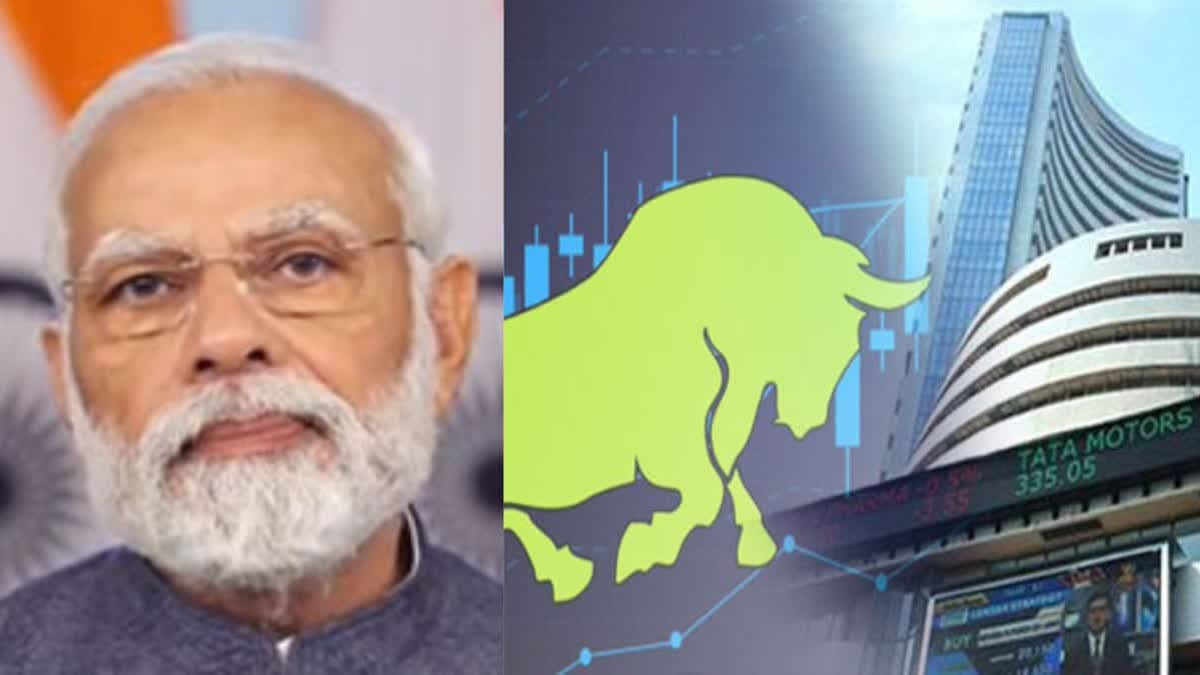New Delhi: Indian stock indices continued their uptrend from the past week and opened at fresh record highs at the opening bell on Monday, a day after Prime Minister Narendra Modi and his Union Council of Ministers took oath to office.
A smooth transition in the government formation seemed to have boosted market sentiments. At the time of filing this report, Sensex was at 76,890.34, up 0.3 per cent, and Nifty at 23,372 points, up 0.4 per cent. They hit their record highs at 76,960.96 points and 23,411.90 points, respectively, at opening today.
Most of the sectoral indices were in the green. As the week progresses, analysts believe that investors will keep an eye on the upcoming US Fed interest rate decision, India's inflation data (both retail and wholesale), and decisions of the new government. Allocation of ministry portfolios to the newly sworn in ministers would also be keenly tracked by markets.
India's retail inflation eased to 4.83 per cent in April, down from 4.85 per cent in March. However, consumer food price inflation surged to 8.70 per cent from 8.52 per cent last month. The retail inflation in India though is in RBI's 2-6 per cent comfort level but is above the ideal 4 per cent scenario.
"...global cues, particularly the upcoming US Fed meeting, will be closely watched by participants. The recovery following the post-election decline suggests resilience among participants, and we expect the prevailing tone to continue," said Ajit Mishra, SVP, Research, Religare Broking Ltd. "The renewed participation of sectors like IT and FMCG, which were previously on the sidelines, supports our confidence. However, traders should remain cautious and focus on stocks that are moving in line with the benchmark," Mishra added.
Next week's focus will be on the allocation of key cabinet portfolios such as Finance, Defense, Roads, Energy, Commerce, and Railways. The market will continue to be volatile with upward biasedness," Siddhartha Khemka, Head - of Retail Research, at Motilal Oswal Financial Services Ltd, said over the weekend.
Dalal Street was expecting a historical spurt in the benchmark indices after the exit poll but failed to see what was coming the very next day. On June 4, the poll results day, the market witnessed bloodbath when Sensex declined by a whopping 4,389.73 points while Nifty fell by 1,379.40 points. Indian stocks witnessed a bloodbath on the day the Lok Sabha results were announced, where incumbent BJP performed below par and seemed it may fall short of exit poll predictions and the majority mark on its own. The national democratic alliance (NDA) though managed to get a comfortable majority, eventually.
Many investors booked their profits they accumulated from the gains they made a day after the exit poll predictions indicated comfortable majority for BJP. All of the losses incurred on June 4 have been recovered over the next couple sessions and the indices are again at their record highs.
"After the roller coaster ride last week the market is likely to take a breather in the near-term. It is important to understand that the major driving force in this bull market is the Indian retail investors including HNIs. Big selling by FIIs is getting eclipsed by the aggressive buying of DIIs and retail investors. The fact that retail investors bought equity for Rs 21179 crores on June 4th, the day Nifty tanked 5.9 per cent, indicates the buying power and optimism of the retail investors," said V K Vijayakumar, Chief Investment Strategist, Geojit Financial Services.
"This is a structural long-long term trend. FII selling on concerns of high valuations will be easily absorbed by DII plus retail buying. So, if FIIs swim against this trend, they will underperform in one of the best performing stock markets in the world. That said, retail investors should not chase highly valued mid and small caps. Safety is in largecaps."
Read More



